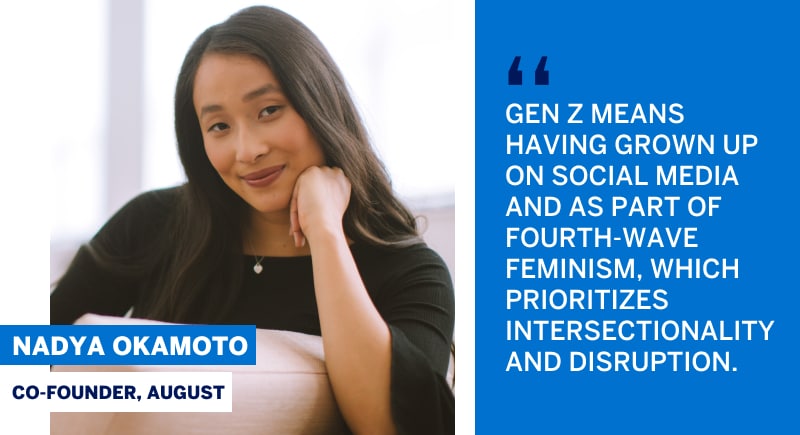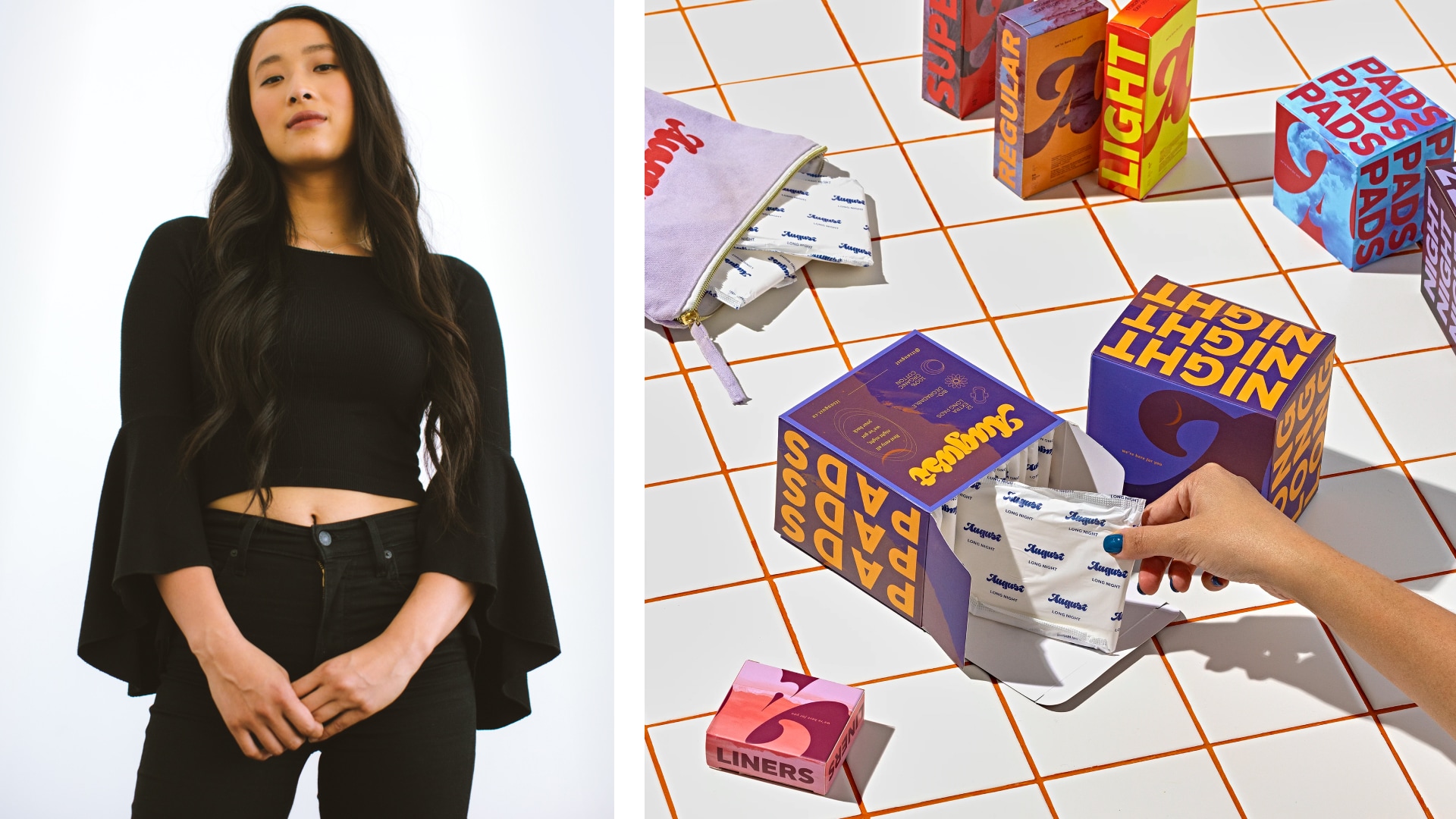Co-founder. Author. CEO. These are just a handful of the roles that 24-year-old Nadya Okamoto has played in her career so far. When Okamoto, now based in Brooklyn, New York, was in high school in Portland, Oregon, she founded PERIOD, a nonprofit that fights to end period poverty and stigma. Her mission? To change and normalize the conversation around periods and empower people who menstruate.
It started with Okamoto and a group of friends making packages containing period products and delivering them to local people in need. As word spread about what they were doing, demand increased, and around six months later, PERIOD became a national organization. Today, it provides sanitary supplies to more than 350 organizations across the U.S. and around the world. Nadya led the organization as executive director for six years before passing on the reigns, and the organization now continues under new leadership.
Okamoto led PERIOD until 2020, overseeing the distribution of more than 20 million period products and publishing her debut book Period Power: A Manifesto for the Menstrual Movement along the way. From there, she was well positioned to launch the purpose-led brand August, co-founded with Nick Jain, which strives to create “more sustainable, ethically made, and impactful” period care.

While the average sanitary pad takes between 500 and 800 years to decompose, according to August, August pads, which are made from 100% organic cotton, take just 12 months. The brand also covers the “luxury item” tax (AKA the tampon tax) charged on period products for customers who live in states (currently 21 out of 50) where it applies. Not to mention, every direct-to-customer purchase has some sort of giveback component embedded – whether that be donating products to the August nonprofit partners, or allowing customers to choose an organization to donate 1% of their sale. To date, August has donated over 150,000 period products to No More Secrets, a Philadelphia-based nonprofit addressing period poverty for low-income menstruators.
I talked to Okamoto about the work she’s doing, the power of social media, and how August is making the conversation around menstruation more inclusive.
Rebecca Brown: You founded the nonprofit PERIOD when you were just 16 years old. What inspired you?
Nadya Okamoto: I was inspired to start PERIOD after learning about period poverty and the tampon tax that, at the time, existed in 40 states in the U.S. This was around 2014.
RB: And after that, you launched your brand August. Why was this your next move?
NO: I decided to start August with my co-founder in January 2020. Before then, I had been working in the nonprofit sector for many years as the founder of PERIOD, and several years ago, I started to feel like I could personally make a bigger impact on period care. I knew that it could be more sustainable, ethically made, and impactful – and that’s what August aims to address. When I started PERIOD, I had no interest in starting a brand, but everything I learned during my nonprofit work is what led me to start August.
RB: While growing your nonprofit and brand, what has been your biggest learning?
NO: Personally, I think that my biggest takeaway has been remembering to take care of myself and not lose myself in work. I really prioritize my self-care habits, such as yoga and trying to sleep as much as possible every night. It’s definitely taken longer than I would have hoped to learn the lesson about sleep, but I’m really happy I have now.
For me, social media has been a tool to build community, connect with other people to keep building with, and of course, to build my business now, too.
—Nadya Okamoto, co-founder, August
Professionally, I think my biggest lesson has been to delegate to and trust others, because leading anything is hard work and you cannot do it alone. I feel so humbled every single day by this work, and really value mentorship from those I work with. I wake up each day feeling like I still have so much to learn and I’m eager to do the work to keep growing.
RB: You’ve previously said that the conversation around periods needs to be inclusive of different genders. How do you approach representation and intersectionality at August?
NO: At our core, we pride ourselves on being a gender-inclusive brand. So everything from our branding to our messaging and all communications that leave our HQ are gender inclusive. As a digitally native brand, we’re always creating new content and campaigns, and we’ll continue to work to be more inclusive every day – whether that be with gender, race, or in collaborating with disabled menstruators, too.
RB: How do you feel about other brands entering the purpose-led space? Is this something you hope to see more of?
NO: I hope that all brands evolve to be purpose driven. I find it necessary and exciting! I’m excited about how more brands are pushing to be traceable and transparent, and how sustainable choices and even carbon neutrality are becoming more like norms in the consumer packaged goods space, especially.
RB: Would you say that you identify as Gen Z, and if so, what does that label mean to you?
NO: Yes, I do! I’m definitely on the older side of Gen Z as someone born in 1998, but to me, being Gen Z means having grown up on social media and as part of fourth-wave feminism, which prioritizes intersectionality and disruption.
RB: I don't need to tell you that social media can be a powerful tool in getting your message out there. How have you used it to build a movement that’s changing the conversation around periods?
NO: Social media has been my greatest tool since I first started my nonprofit work at age 16, because it was the free tool I had at my fingertips for all awareness building. For me, social media has been a tool to build community, connect with other people to keep building with, and of course, to build my business now, too.
RB: When you launched August, you posted to TikTok 100 times a day to get noticed. What impact did this have in terms of brand awareness?
NO: I definitely tried to post 100 times a day for the first six months … and it worked. By the end of 2021, my own TikTok platform had grown to two million followers. But 100 times a day was a lot to keep up and I definitely don’t post that much anymore.
RB: You’ve published your first book and founded a nonprofit and a purpose-led brand. What do you see yourself doing next?
NO: I’m going to continue working on building August, supporting our community, and trying to make an impact on the overall conversation about periods and what period care is from the social-enterprise side.
Photos: Courtesy of Nadya Okamoto

